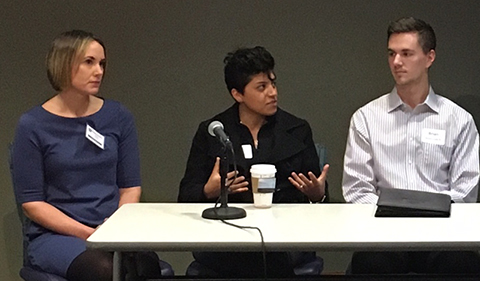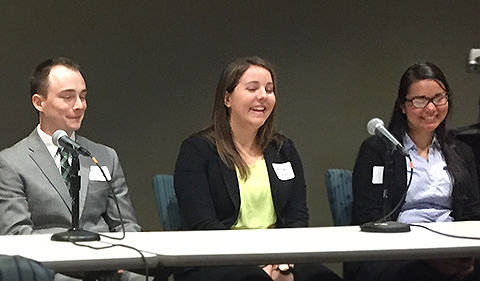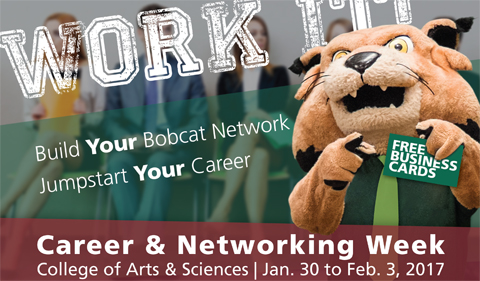
Sociology panelists Julie Conrad, Aisha Tufail, and Brian Bilinovich. Photo credit: Lisa Cohen
By Mercedes Lewis ’18 and Monica Davis ’21
Several alumni returned to campus for a Sociology and Sociology-Criminology career panel during the College of Arts & Sciences Career and Networking Week earlier this semester to give students advice on jobs, networking, and the real world.
There was a Q&A session where audience members could ask the panelists questions that went more into depth on networking.
Monica Davis and I were in the audience.
First, The Panelists
Brian Bilinovich ’14 Sociology-Criminology major, Inside Property Claims Representative for Westfield Insurance
Julie Conrad ’04 Sociology-Criminology major, Quality Manager for JPMorgan Chase
Katherine Copas ’15 Economics and Sociology double major, Internal Audit Analyst for JPMorgan Chase
Michael Richard ’12 Sociology and Mathematics double major, ’13M Sociology, Anti-Money Laundering Investigator for Discover Financial Services
Jenna Richards ’14 Psychology and Sociology double major, ’16M Sociology, Recruiter for Kroger
Aisha Tufail ’06 Sociology major, ’09M Sociology, Entrepreneur and recent Owner/Operator of a D.P. Dough store
How do you think your degree in Sociology best prepared you for the real world?
This is the first question that the panelists were asked, and they all agreed that a Sociology degree gave them the skills that they needed to effectively communicate with different types of people.
Conrad said that it has helped her to be more open-minded and understand that individuals have different backgrounds.
Any moments from your career where you realized your schooling came into play?
Richards mentioned “Group Projects. You do them for a reason…You’re going to have to learn to how collaborate and give and take.” Billnovich added to the group projects conversation with “You also have to learn how other people work as well, some might need a little push.”
From people who have dealt with multiple group projects over the years, it’s reassuring that the skills people use when doing group projects for big parts of our grade transfers to the workforce.

Sociology panelists Michael Richard, Jenna Richards, and Kathy Copas. Photo credit: Monica Davis
How did your social network help get your jobs?
Copas commented “A professor came to me and there was a recruiting event going on and they told me to check it out…I interacted with people, talked to people and put myself out there…I already had a relationship with this professor who had a relationship with someone else and they just connected us.”
This is something that is pushed throughout college, connecting with your professor.
Hearing it from our professors and hearing it from someone who graduated only a year or two ago has a different impact, and I personally took that advice to heart.
First Few Jobs
Panelists spent a few minutes talking about their jobs after college.
Richards reassured us that our first job after college won’t be our job forever, and that it’s a chance to figure out what we like and what we dislike. She and Bilinovich both agreed that everyone’s first job is a learning experience.
The panelists were in agreement that it’s important for us to establish our networks now. That we should start forming relationships with alumni, and keep an open mind when creating our networks.
What’s the best way to network?
Conrad commented “This. These types of events. Anytime you can connect as a student with somebody who’s an alumnus is huge…I may know somebody in the field you’re looking in.”
Just from seeing the dedicated students who sat to listen to these experiences shows that we’re taking this advice seriously.
Student Perspective
The panelists had a lot of interesting advice for us, for now and in the future.
Having alumni of my major is useful since they were once in my shoes.
Being able to get their side of things is great and enlightening, but being able to have that connection with someone and maintain it, whether it’s as a mentee or just a student connecting with alumni, is beneficial and reminds us as students that we’re forever a part of the Bobcat family.
Davis agrees, “I thought that the panelists gave a lot of useful information and advice that all students could use, regardless of their major. It was interesting to see how the alumni are doing out in the real world, and how OHIO has helped them succeed.”




















Comments